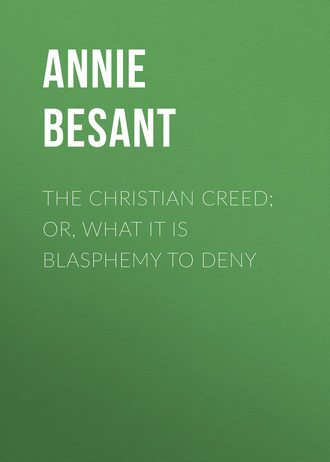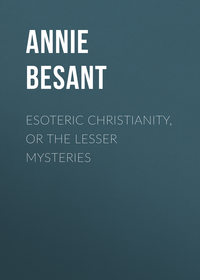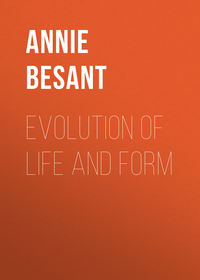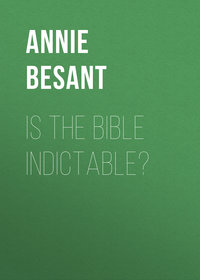 полная версия
полная версияThe Christian Creed; or, What it is Blasphemy to Deny
The odd little interlude which takes up vv. 24, 25, 26 of the same chapter has been a sore trouble to commentators. Why "the Lord" tried to kill somebody, who it was he tried to kill, where "the inn" was by which he met him, what the mutilation of her son by Zipporah had to do with the quarrel, all these things have been discussed and re-discussed ad nauseam. Students of ancient religions will find that nature-worship throws some light on the matter, but it is blasphemous light, and must be carefully avoided by all true believers who are anxious about the salvation of their souls.
It is blasphemy to say that god was known to Abraham "by my name Jehovah" (Ex. vi., 8); it is also blasphemy to deny that Abraham knew him as Jehovah and "called the name of the place Jehovah-jireh" (Gen. xxii., 14).
It is blasphemy to deny that Moses turned all the water in Egypt, the water in streams, rivers, ponds, pools, as well as all in vessels; after all the water had been thus turned into blood, the Egyptian magicians turned the rest into blood (Ex. vii., 19, 20, 22). This is a very remarkable miracle, showing great skill on the part of the Egyptians.
It is blasphemy to deny the historical truth and perfect accuracy of the Biblical account of the miracles wrought by the hand of the Lord in the land of Egypt. It is very hard work to believe, but we must try, for it is clear that if we go to gaol for denying them, we shall not get out "till we have paid the uttermost farthing" demanded by law.
First, we must believe that "the Lord" kept on sending messages to Pharaoh, commanding him to let the people go, while at the same time "the Lord hardened Pharaoh's heart, so that he would not let the children of Israel go" (Ex. x., 20). It is blasphemy to deny that god behaved in this horribly wicked manner, compelling Pharaoh to refuse, and then plaguing him and his people for the refusal; we deserve damnation if we do not agree with Paul, when he writes: "It is not of him that willeth, nor of him that runneth, but of God that showeth mercy. For the Scripture saith unto Pharaoh, Even for this same purpose have I raised thee up, that I might show my power in thee, and that my name might be declared throughout all the earth. Therefore hath he mercy on whom he will have mercy, and whom he will he hardeneth. Thou will say then unto me, Why doth he yet find fault, for who hath resisted his will? Nay but, O man, who art thou that repliest against God? Shall the thing formed say to him that formed it: Why hast thou made me thus?" (Rom. ix., 16-20.) Yes, most certainly it should so say, if it be a living sentient thing, capable of enjoyment and of agony. No god has the right to create sentient beings, to harden them, and then to find fault with them and torture them for being hardened. The challenge, "Why doth he yet find fault?" is a very proper one, and Paul cannot answer it, so he falls back on god's power to do as he chooses; but the exercise of the power would be a crime, and if it be blasphemy to say that such unutterable wickedness is criminal, then I will blaspheme as long as I live, rather than turn flattering courtier to a monarch more cruel than Caligula, a despot more tyrannical than any Eastern potentate known to history.
After the duel about the water between Moses and the Egyptian magicians – in which the magicians certainly shewed the greater power and dexterity-Moses and Aaron covered the land of Egypt with frogs (Ex. viii., 6), and again the magicians proved quite as capable. Exit frogs. Enter lice. This was too much for the magicians; "all the dust of the land became lice" (viii., 17) – note this proof of spontaneous generation-so the material was lacking to the magicians, but as they had done so well in turning the water into blood after it had all become blood already, it is disappointing to find that they broke down at this critical period. Perhaps they were tired.
Exit lice. Enter flies. That was a very horrid plague. Blue-bottles everywhere. They filled the cream-jugs, they covered the joints, they fell into the jam, they stuck in the treacle. Fly-papers went up 100 per cent, and several gentlemen in the profession made fortunes during the rush. "A greater than" these, however, came to the rescue: "the Lord" himself "removed the swarms of flies," and joyful to relate, "there remained not one" (viii., 31). I should like to have spent the remainder of that summer in Egypt. As day after day went on, and not a solitary buzz was heard, how joyfully must the maids and matrons of Egypt have chanted in thankful chorus: "Fly not yet!"
Pharaoh's heart remaining petrified, an attack was made on the flocks and herds. "A very grievous murrain" was sent "upon thy cattle which is in the field, upon the horses, upon the asses, upon the camels, upon the oxen, and upon the sheep" (Ex. ix., 3). And they all died. Between the dead frogs and the dead cattle Egypt must have been… well, let us say fragrant. While they were all lying there dead, god sent boils on them; the object of this is not clear, and it is a little difficult to understand how the boils flourished on cold corpses; still the Scriptures cannot lie, and thus it is written. With that appropriateness which shews real genius, Moses, at the Lord's command, sprinkled "handfuls of ashes of the furnace," and in "these ashes glowed their former fires," and they caused "a boil."
The next miracle is a very remarkable one. Forgetting that all the beasts were dead and boiled, the Lord said: "Send therefore now and gather thy cattle and all that thou hast in the field; for upon every man and beast which shall be found in the field and shall not be brought home, the hail shall come down upon them and they shall die" (ix., 19). Some made their dead "cattle flee into the houses," thus showing a skill and a miracle-working power which must have made Moses very jealous; others left theirs in the field, probably thinking that the boil-covered carcases were not worth the trouble of carriage. Down came the hail, and smote "all that was in the field, both man and beast" (ix., 25). Here indeed was an exemplification, so far as the cattle were concerned, of the second death.
Next came the locusts, to "eat the residue of that which is escaped, which remaineth unto you from the hail" (x., 5). As the hail "smote every herb of the field and brake every tree of the field" (ix., 25), there cannot have been much left for the locusts; however, they made a clean sweep of all the vegetable life in Egypt, "and there remained not any green thing in the trees or in the herbs of the fields" (x., 15). On the whole it was by a merciful dispensation of Providence that the cattle were all dead, and were not left to starve. As all the animals were dead and there were no plants left, the Lord had nearly come to the end of his plagues; so he sent "darkness which may be felt" for three days, while trying to invent some more. None of the Egyptians, we are told, rose "from his place for three days;" why nobody struck a light we are not told; now-a-days we often have plagues of darkness in London from the fogs, but we make shift with gas and the electric light until the sunlight returns.
The last miracle in Egypt was a very wonderful one; it was the killing for the third time of some-the first-born- cattle. The first-born of men were also slain; but that was only for the first time, and all men are mortal. This was too much for the Egyptians, and they rose up to drive out the Israelites, the latter picking up, as they went, "jewels of silver, jewels of gold, and raiment" (xii. 35), and so robbing their unlucky hosts of the little property they had left.
But poor Pharaoh was not yet safe: "The Lord hardened the heart of Pharaoh king of Egypt, and he pursued after the children of Israel" (xiv. 8). He yoked into his chariots the twice-slain horses, and mounted his men on others of these re-revivified quadrupeds, and galloped after the flying robbers. God, to deliver his people, divided the sea before them, piling up the waters on each side as a wall. Down along this curious and unique path plunged the men and the horses, the latter probably thinking that one death, more or less, couldn't hurt them. A new difficulty arose. God pulled off their chariot-wheels, and so delayed them; and then suddenly down came the water-walls, and the poor Egyptians were all drowned. Like the flies and the locusts, "there remained not so much as one of them" (xiv. 28). The horses also were drowned, and let us hope they did not come to life again.
Thus endeth the story of the miracles of Egypt, which story is part of the Christian creed as defined by law, and which it is blasphemy to deny.
After the Lord had thrown "the horse and his rider" into the sea, the children of Israel went on into the wilderness, and found no water for three days. At the end of that time they found some "bitter" water, but the Lord showed Moses a tree which made the water sweet. Genus and species not revealed to us. It is very odd that, when the Bible mentions anything that might be practically useful, it never gives such particulars as would enable us to repeat the experiment.
The next trial to our faith is the story of the manna. The people might well ask: "What is this?" It was so expansible and contractile that, when they measured it, having "gathered some more, some less," if a man gathered much he had "nothing over, and he that gathered little had no lack" (Ex. xvi., 17, 18). This curious result of measuring it "with an omer" is, however, susceptible of explanation, for we read, in Ex. xvi., 36, that "an omer is the tenth part of an ephah," whereas, in Ezech. xiv., the ephah contains "the tenth part of an homer." Perhaps in measuring some of the Jews dropped their h's. The variable expansion of the manna is not its only peculiarity. Manna gathered on Thursday "bred worms and stank" if kept till Friday; manna gathered on Friday "did not stink, neither was there any worm therein" on Saturday (xvi., 20 and 24).
The bread difficulty disposed of, the water difficulty again came to the front, but Moses smote a rock, and water came out of it (Ex. xvii., 6). Later, under very similar circumstances, Moses smote another rock with the like result (Numb, xx., 11.), and the Lord was very angry with him, and refused to let him enter "the promised land." It is curious that in both these cases the place was called Meribah, because of the complaints of the Israelites; but it would be blasphemy to say that two traditions of one incident have been inserted in the text.
Soon after this a wonderful battle took place, in which Israel fought against Amalek, and "it came to pass when Moses held up his hand that Israel prevailed, and when he let down his hand Amalek prevailed" (Ex. xvii., 11). The relation of cause and effect is not clear, but it is satisfactory to know that Moses' hands were held up by main force until evening stopped the slaughter.
It is blasphemy to say that there are more gods than one (Statute of Will. III.), yet it is blasphemy to deny that "the Lord is greater than all gods" (Ex. xviii., 11). It is hard to understand how the Lord can be greater than gods which do not exist; nevertheless "he that believeth not shall be damned."
Chapters xix. and xx. of Exodus can only be believed by those who have not risen above the most anthropomorphic conception of their god. God is everywhere, yet Moses went backwards and forwards between the people and god (xix., 3-9). God is everywhere, yet Moses "brought forth the people out of the camp to meet with God" (v., 17), and "the Lord descended upon" a particular mountain (v. 18), and "came down upon Mount Sinai, on the top of the mount" (v. 20). God is invisible, one "whom no man hath seen nor can see" (1 Tim. vi., 16), whom "no man hath seen at any time" (John L, 18); yet he was afraid lest the people should "break through unto the Lord to gaze" (Ex. xix., 21), and up the mount went "Moses, and Aaron, and Nadab, and Abihu, and seventy of the elders of Israel; and they saw the God of Israel" (Ex. xxiv., 9, 10). God dwells "in the light which no man can approach unto" (1 Tim. vi., 16), and "God is light and in him is no darkness at all" (1 John i., 5); yet "Moses drew near onto the thick darkness where God was" (Ex. xx., 21). It is blasphemy to deny that all these contradictions are true.
It is blasphemy to deny that god, on Mount Sinai, gave commands among which we find the following revolting and immoral ones: If the owner of a Hebrew slave give the slave a wife, and the slave goes out at the end of seven years, "the wife and her children shall be her master's; he shall go out by himself" (Ex. xxi., 4). The wife is like any other female animal; she and her young belong to her master, and she may be used to increase his stock. If the husband and father clings to his family, god mercifully allows him to buy the right to live with them with the price of his freedom. A man may sell his daughter to be a concubine, and if her purchaser starve her, or let her go naked, or does not perform his marital duty, she may leave him (vv. 7-11). A man may beat his man or woman slave to death, provided that he or she lives "a day or two" after the flogging, for "he is his money" (vv. 20, 21), and the loss of his valuable chattel is punishment sufficient. If an ox gore a man, the ox is to be stoned (v. 28), a form of vivisection which Lord Coleridge can scarcely approve; but, as Paul says: "Doth god take care for oxen?" (1 Cor. ix., 9). If the ox gore a slave, the owner of the slave is to be paid for the value of his property (v. 32). If a thief be unable to restore the double or fourfold value, as the case may be, of that which he has stolen, "then he shall be sold for his theft" (xxii., 3). A witch is to be murdered (v. 20). An idolater is to be murdered (v. 20). "The first-born of thy sons shalt thou give unto me. Likewise shalt thou do with thine oxen and with thy sheep" (vv. 29, 30). Is it credible that by the law of England it should be blasphemy to deny that these horrible commands are "of divine authority"?
And as though to show that this book is of purely human origin, with the mingled good and evil inseparable from all early efforts at legislation, we read, after the foregoing horrors the following noble and generous teaching:
"Thou shalt not raise a false report: put not thine hand with the wicked to be an unrighteous witness. Thou shalt not follow a multitude to do evil; neither shalt thou speak in a cause to decline after many to wrest judgment. Neither shalt thou countenance a poor man in his cause.
If thou meet thine enemy's ox or his ass going astray, thou shalt surely bring it back to him again. If thou see the ass of him that hateth thee lying under his burden, and wouldest forbear to help him, thou shalt surely help with him. Thou shalt not wrest the judgment of thy poor in in his cause. Keep thee far from a false matter; and the innocent and righteous slay thou not: for I will not justify the wicked. And thou shalt take no gift: for the gift blindeth the wise, and perverteth the words of the righteous. Also thou shalt not oppress a stranger: for ye know the heart of a stranger, seeing ye were strangers in the land of Egypt." (xxiii., 1-9.)
Here we see the pen of some lofty and tender lawgiver, who has nothing in common with the savage chief who "breathed out threatenings and slaughter."
It is blasphemy to deny that the Lord on Mount Sinai gave a number of frivolous commands, about a candlestick (Ex. xxv., 31-39) with its snuff-dishes, and curtains, and hangings, and dresses, with their trimmings of "a golden bell and a pomegranate, a golden bell and a pomegranate, upon the hem," and "holy ointment," and "perfume," etc., etc. (Ex. xxv. – xxx.). After the making of stars and suns it seems but poor work to give directions about "loops," and "taches," and a "curious girdle," fitter employment for a cabinet maker and a tailor than for a god with "thunders and lightnings, and a thick cloud upon the mount, and the voice of the trumpet exceeding loud." While Moses and the Lord were discoursing on upholstery the people were getting into trouble down below, and god, who is "without passions," (Art. 1) felt his wrath "wax hot against them" (Ex. xxxii., 10). Moses did not ask for forgiveness on the ground of god's goodness, but he appealed to his vanity, and reminded him that the Egyptians would crow over him if he destroyed his own people (xxxii., 12.) Thereupon god, who is not a man "that he should repent" (Numb, xxiii., 19), "repented of the evil which he thought to do" (Ex. xxxii., 14). God who is "without body" (Art 1) had written two tables with his "finger" (Ex. xxxi., 18), and these tables "were the work of god, and the writing was the writing of god" (xxxii, 16). So careless was Moses of this unique specimen that he lost his temper and broke it in pieces, and then, arriving at the camp, he sent the sons of Levi through the camp, bidding them "slay every man his brother, and every man his companion, and every man his neighbor," and when 3,000 men had fallen he bade the murderers: "Consecrate yourselves to-day to the Lord, even every man upon his son and upon his brother, that he may bestow a blessing upon you" (w., 27-29). Yet it is blasphemy to deny that this great wickedness was god-inspired.
It is blasphemy to deny that "the Lord spake unto Moses face to face" (Ex. xxxiii., 11); also it is blasphemy to deny that god told Moses: "Thou canst not see my face, for there shall no man see me and live" (v. 20, compare with ch. xxiv., 10, 11). And while it is blasphemy to deny that god is "without parts" (Art 1), it is equally blasphemy to deny that he has "back parts" (Ex. xxxiii., 23). Either the Prayer Book or the Bible clearly needs revision; meanwhile it is blasphemy to deny either.
It is interesting to observe the fashion in which Christians pick and choose among the commandments given "by divine authority" while they imprison heretics for attacking those of which they, in their turn, disapprove. Thus we have (Ex. xxxv., 2, 3): "Six days shall work be done, but on the seventh day there shall be to you a holy day, a sabbath of rest to the Lord; whosoever doeth work therein shall be put to death. Ye shall kindle no fire throughout your habitations upon the sabbath day." The Sabbatarians quote verse 2 as a reason for shutting up all museums and art galleries on "the Lord's day," and they abuse as rebels against the law of god all the liberal-minded of their own creed. But they quietly ignore verse 3, because that would cause discomfort to themselves, and the very peers who, in the House of Lords, vote to shut working men out of art education go home to sit over their comfortable fires, and to wander through their own galleries wanned by a fire kindled against their god's direct command. Wonderful, indeed, are the ways of religious men!
The book of Leviticus is "of divine authority." It is blasphemy to deny that a bullock, flayed and cut into pieces and burned, makes a sweet smell to god (Lev. L, 5-9). Tastes differ. Also burning a goat, with "the fat that covereth the inwards, and all the fat that is upon the inwards, and the two kidneys, and the fat that is upon them, which is by the flanks" (iii., 14, 15), makes a sweet savor as it frizzles and drips. The tabernacle of the congregation must have smelt like the kitchen of a dirty cook. Yet it is blasphemy to deny that god enjoyed it. "All the fat is the Lord's" (16). Not a morsel of fat might the Israelite eat (17). Personally, I should have been quite willing to give all the fat to the Lord, but some of the people probably felt envious.
It would be wearisome to recite all the extraordinary commands given by god in this "third book of Moses." Christians disregard them, on the pretence that the ceremonial law is not binding on them, yet it is blasphemy to deny that "whosoever shall break one of these least commandments, and shall teach men so, he shall be called the least in the kingdom of heaven" (Matt, v., 19).
It is blasphemy to deny that the hare chews the cud (xi., 6); as a matter of mere fact it does nothing of the kind. It is blasphemy to deny that the locust, the beetle, and the grasshopper have more than four feet (xi., 21-23); as a matter of fact they each have six. It is very awkward when fact and faith clash in this numerical fashion.
It is blasphemy to deny that god concerns himself with the way a man cuts his beard; "neither shalt thou," says he, "mar the corners of thy beard" (xix., 27). Is it conceivable that the creator of the universe should trouble himself with such barber's work as this? If such a being existed would it not rather be blasphemy to ascribe such directions to him?
It is blasphemy to deny that Jahveh, like other gods of his time, commanded human sacrifice. He says: "No devoted thing that a man shall devote unto the Lord of all that he hath, both of man and beast, and of the field of his possession, shall be sold or redeemed; every devoted thing is most holy unto the Lord. None devoted which shall be devoted of men shall be redeemed, but shall surely be put to death" (xxvii., 28, 29). This abomination is commanded by divine authority, and he is in danger of gaol and damnation who shall honestly repudiate the detestable thing.
It is blasphemy to deny that Jahveh ordained the disgusting trial of a wife suspected of infidelity which is related in Numbers v., 12-31. If the "spirit of jealousy" come on a man, he is to bring his wife to the priest. "And the priest shall take holy water in an earthern vessel; and of the dust that is in the floor of the tabernacle the priest shall take, and put it into the water;" this delectable but dirty drink is to be swallowed by the woman, after a charm has been repeated by the priest, as "an oath of cursing," and if the woman has been unfaithful the water will have very unpleasant physical results, while if the suspicion of her husband be false "she shall be free." This prompt way of settling matters would obviate all the expenses and formalities of a divorce court, and if the arrangement could be extended to include unfaithful husbands, this Christian country would be saved much cost. But though the Christians punish other people for unbelief they are thorough infidels themselves in all practical matters. They would far rather trust Sir James Hannen than dirty holy water, when they suspect conjugal infidelity.
It is blasphemy to deny that Jahveh was so passionate (God is without passions, Art. I.), and so vain that he could only be restrained from smiting his people by the appeal of Moses to his vanity: "Then the Egyptians shall hear it… and they will tell it to the inhabitants of this land… the nations which have heard the fame of thee will speak, saying: Because the Lord was not able to bring this people into the land which he sware unto them, therefore he hath slain them in the wilderness" (Numbers xiv., 12-16). This suggestion, most ingeniously introduced by Moses – who "managed" Jahveh with admirable tact – proved successful, and "the Lord said, I have pardoned according to thy word" (v. 20). Yet it is blasphemy to say that god changes his purpose.
Furthermore, although it is blasphemy to deny that u he is faithful that promised" (Heb. x., 23), yet we must believe that Jahveh declared to the Israelites, "ye shall know my breach of promise" (Numbers xiv., 34).
It is blasphemy to deny that Jahveh commanded that a man who "gathered sticks upon the sabbath day" (xv., 32-36) should be stoned to death. Yet is it equally blasphemy to deny that Jesus, the representative and first-begotten of Jahveh, condemned the Pharisees who declared that his disciples did "that which is not lawful to do upon the sabbath day" (Matt, xii., 2), when they gathered corn.
The poor Pharisees tried to obey the law as given by Jahveh; their reward was to be condemned by his son. Yet it is blasphemy to deny that "I and my Father are one" (John x., 30).
It is blasphemy to deny that Jahveh commanded the Israelites to "make them fringes in the borders of their garments throughout their generations, and that they put upon the fringe of the borders a riband of blue: and it shall be unto you for a fringe" (Numbers xv., 38, 39). It is hard to believe, though it is blasphemy to deny, that the "Eternal Spirit" troubled himself about "a fringe."
It is blasphemy to deny that there is a "pit," within the earth, into which people may fall alive, when the earth opens her mouth and swallows them up; further, that Korah, Dathan and Abiram, their wives, their sons and their little children, were so swallowed up, and "went down alive into the pit, and the earth closed upon them" (Numb, xvi., 27-33).






